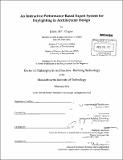An interactive performance-based expert system for daylighting in architectural design
Author(s)
Gagne, Jaime M. L. (Jaime Michelle Lee)
DownloadFull printable version (27.80Mb)
Other Contributors
Massachusetts Institute of Technology. Dept. of Architecture.
Advisor
Leslie K. Norford and Marilyne Andersen.
Terms of use
Metadata
Show full item recordAbstract
Design practitioners are increasingly using digital tools during the design process; however, building performance simulation continues to be more commonly utilized for analysis rather than as a design aid. Additionally, while simulation tools provide the user with valuable information, they do not necessarily guide the designer towards changes which may improve performance. For designing with daylighting, it is essential that the designer consider performance during the early design stage, as this is the stage when the most critical design decisions are made, such as the overall building geometry and faqade elements. This thesis proposes an interactive, goal-based expert system for daylighting design, intended for use during the early design phase. The system gives the user the ability to input an initial model and a set of daylighting performance goals. Performance areas considered are illuminance and glare risk from daylighting. The system acts as a "virtual daylighting consultant," guiding the user towards improved performance while maintaining the integrity of the original design and of the design process itself. This thesis consists of three major parts: development of the expert system, implementation of the system including a user interface, and performance assessment. The two major components of the expert system are a daylighting-specific database, which contains information about the effects of a variety of design conditions on resultant daylighting performance, and a fuzzy rule-based decision-making logic, which is used to determine those design changes most likely to improve performance for a given design. The expert system has been implemented within Google SketchUp along with a user interface which allows a designer to fully participate in the design process. Performance assessment is done in two ways: first by comparing the effectiveness of the system to a genetic algorithm, a known optimization method, and second by evaluating the success of the user interactivity of the tool, its use within the design process, and its potential to improve the daylighting performance of early stage designs.
Description
Thesis (Ph. D.)--Massachusetts Institute of Technology, Dept. of Architecture, 2011. Cataloged from PDF version of thesis. Includes bibliographical references (p. 223-233).
Date issued
2011Department
Massachusetts Institute of Technology. Department of ArchitecturePublisher
Massachusetts Institute of Technology
Keywords
Architecture.